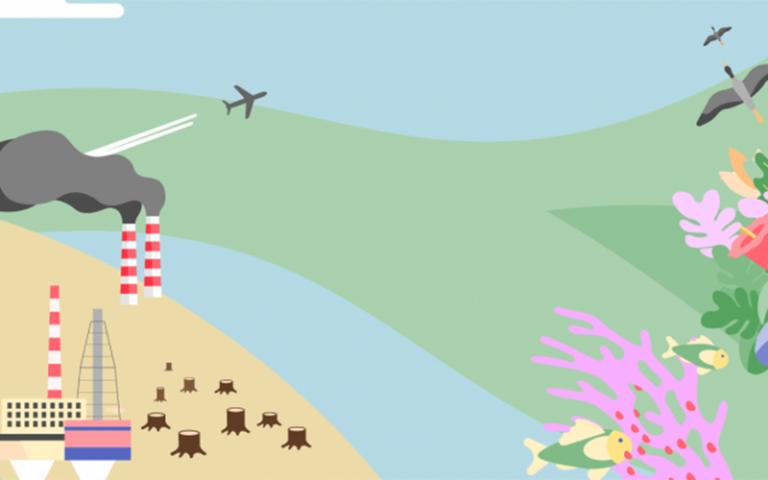Professor Yacob Mulugetta contributes to UN blueprint to solve planetary emergencies
22 February 2021
Professor Yacob Mulugetta, Professor of Energy and Development Policy in UCL STEaPP, has contributed to the development of a new UN Environment Programme (UNEP) synthesis that provides a blueprint to urgently solve planetary emergencies and secure humanity’s future.

The report, Making Peace with Nature, lays out the gravity of the climate, biodiversity and pollution crises by drawing on a number of global assessments, including those from the Intergovernmental Panel on Climate Change and the Intergovernmental Science-Policy Platform for Biodiversity and Ecosystem Services, as well as UNEP’s Global Environment Outlook report and new findings on the emergence of zoonotic diseases such as COVID-19.
The authors assess the links between multiple environmental and development challenges, and explain how advances in science and bold policymaking can open a pathway towards the achievement of the Sustainable Development Goals by 2030 and a carbon neutral world by 2050 while bending the curve on biodiversity loss and curbing pollution and waste. Taking that path means innovation and investment only in activities that protect both people and nature. Success will include restored ecosystems and healthier lives as well as a stable climate.
Amid a wave of investment to re-energise economies hit by the COVID-19 pandemic, the blueprint communicates the opportunity and urgency for ambitious and immediate action. It also lays out the roles that everyone, from governments and businesses to communities and individuals, can and must play. This year is especially crucial, with upcoming climate and biodiversity convention meetings, UNFCCC COP 26 and CBD COP 15, where governments must come up with synergistic and ambitious targets to safeguard the planet by almost halving greenhouse gas emissions in this decade, and by conserving and restoring biodiversity.
Tackling three planetary threats together
Economic growth has brought uneven gains in prosperity to a fast-growing global population, leaving 1.3 billion people poor, while tripling the extraction of natural resources to damaging levels and creating a planetary emergency. Despite a temporary decline in emissions due to the pandemic, Earth is heading for at least 3°C of global warming this century; more than 1 million of the estimated 8 million plant and animal species are at substantially increased risk of extinction; and diseases caused by pollution are currently killing some 9 million people prematurely every year. Environmental degradation is impeding progress towards ending poverty and hunger, reducing inequalities and promoting sustainable economic growth, work for all and peaceful and inclusive societies.
The report shows how this trio of environmental emergencies interact and have common causes, and thus can only be effectively addressed together. Subsidies on fossil fuels, for instance, and prices that leave out environmental costs, are driving the wasteful production and consumption of energy and natural resources that are behind all three problems.
Inger Andersen, Executive Director of UNEP, said the report highlighted the importance of changing mindsets and values, and finding political and technical solutions that measure up to the Earth’s environmental crises.
“In showing how the health of people and nature are intertwined, the COVID-19 crisis has underlined the need for a step-change in how we view and value nature. By reflecting that value in decision-making – whether we are talking about economic policy or personal choices – we can bring about a rapid and lasting shift toward sustainability for both people and the environment,” she said. “‘Green recovery’ plans for pandemic-hit economies are an unmissable opportunity to accelerate the transformation.”
Released ahead of the fifth UN Environment Assembly, the report presents a strong case for why and how urgent action should be taken to protect and restore the planet and its climate in a holistic way.
It presents examples of what transformative change can look like, and how it can create prosperity, employment and greater equality. Far-reaching change involves recasting how we value and invest in nature, integrating that value into policies and decisions at all levels, overhauling subsidies and other elements of economic and financial systems, and fostering innovation in sustainable technologies and business models. Massive private investment in electric mobility and alternative fuels show how whole industries recognize the potential gains from shifting quickly.
The authors point out that ending environmental decline in all its forms is essential to advancing many of the Sustainable Development Goals, in particular poverty alleviation, food and water security and good health for all. An example is how intensifying agriculture and fishing in sustainable ways, allied with changes in diets and lower food waste, can help end global hunger and poverty and improve nutrition and health while sparing more land and ocean for nature.
Reinforcing the call for action, the report stresses the need for stakeholders at all levels of society to be involved in decision-making, and identifies dozens of key actions that governments, businesses, communities and individuals can and should undertake in order to bring about a sustainable world.
Access the full report on the UN Environment Programme website.
Source
Image
- Making Peace with Nature report, UN Environment Programme
 Close
Close

